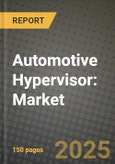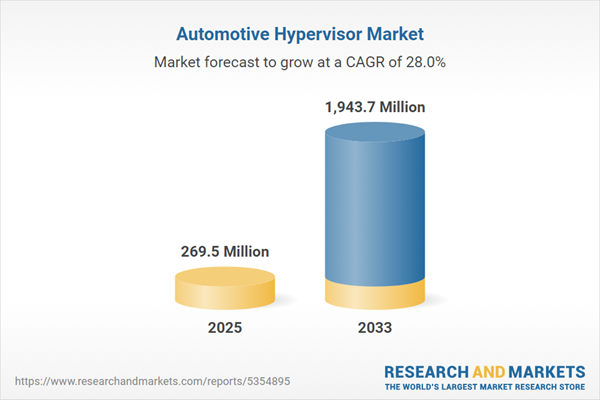The automotive hypervisor market is a rapidly growing segment of the automotive software industry, driven by the increasing complexity and connectivity of modern vehicles. A hypervisor is a virtualization layer that allows multiple operating systems to run simultaneously on a single hardware platform. In the automotive context, hypervisors enable the integration of diverse software systems, such as infotainment, ADAS, and digital instrument clusters, on a single electronic control unit (ECU).
As vehicles become more connected and automated, the need for advanced software solutions to manage multiple systems securely and efficiently is paramount. Hypervisors provide a foundation for secure partitioning, fault isolation, and resource allocation, ensuring that critical safety functions remain unaffected by potential failures in other systems. This technology also simplifies hardware architecture, reducing costs and streamlining the development of new vehicle features.
Despite the clear benefits, the automotive hypervisor market faces challenges related to complexity, cost, and industry standardization. However, as software-defined vehicles and connected car technologies continue to evolve, hypervisors are expected to play a crucial role in enabling seamless, secure, and efficient vehicle operation.
Key Insights: Automotive Hypervisor Market
- A significant trend in the automotive hypervisor market is the shift toward mixed-criticality systems. By running safety-critical and non-critical applications on the same hardware platform, automakers can reduce the number of ECUs and simplify vehicle architecture. Hypervisors ensure that these applications operate securely and independently, enabling greater integration and functionality.
- Another trend is the adoption of open-source and standardized hypervisor solutions. Open-source hypervisors, such as Xen and AGL (Automotive Grade Linux), are gaining traction as they provide a flexible and cost-effective way to develop complex software architectures. Standardization also helps reduce development time, improve compatibility, and accelerate the deployment of new features.
- The growing demand for connected and autonomous vehicles is a key driver of the automotive hypervisor market. As vehicles incorporate more software-driven functions, hypervisors provide the secure and efficient infrastructure needed to manage these complex systems. The shift toward software-defined vehicles further underscores the importance of hypervisors in enabling advanced features and services.
- Another driver is the increasing focus on cybersecurity and functional safety. Hypervisors enhance system security by isolating critical applications from potential threats and ensuring that faults in one system do not affect others. This level of protection is essential as vehicles become more connected and exposed to potential cyber risks.
- One of the main challenges in the automotive hypervisor market is the complexity of implementation. Developing, integrating, and testing hypervisors requires significant expertise and resources. Ensuring compatibility with various hardware platforms, operating systems, and communication protocols adds to the complexity, increasing development time and costs.
- Another challenge is the lack of widespread industry standardization. While open-source initiatives are helping, the automotive industry still faces fragmentation in hypervisor solutions. Achieving a unified standard that meets the needs of automakers, suppliers, and technology providers is critical for driving adoption and fostering a robust hypervisor ecosystem.
Automotive Hypervisor Market Segmentation
By Product:
- Bare-Metal Hypervisors
- Hosted Hypervisors
By Level Of Autonomous Driving:
- Autonomous
- Semi-Autonomous
By Sales Channel:
- Aftermarket
- Original Equipment Manufacturers(OEMs)
By End User:
- Economy Vehicle
- Mid-Priced Vehicle
- Luxury Vehicle
By Geography:
- North America (USA, Canada, Mexico)
- Europe (Germany, UK, France, Spain, Italy, Rest of Europe)
- Asia-Pacific (China, India, Japan, Australia, Vietnam, Rest of APAC)
- The Middle East and Africa (Middle East, Africa)
- South and Central America (Brazil, Argentina, Rest of SCA)
Automotive Hypervisor Market Size Data, Trends, Growth Opportunities, and Restraining Factors:
- This comprehensive Automotive Hypervisor market report delivers updated market size estimates from 2024 to 2034, offering in-depth analysis of the latest Automotive Hypervisor market trends, short-term and long-term growth drivers, competitive landscape, and new business opportunities. The report presents growth forecasts across key Automotive Hypervisor types, applications, and major segments, alongside detailed insights into the current Automotive Hypervisor market scenario to support companies in formulating effective market strategies.
- The Automotive Hypervisor market outlook thoroughly examines the impact of ongoing supply chain disruptions and geopolitical issues worldwide. Factors such as trade tariffs, regulatory restrictions, production losses, and the emergence of alternatives or substitutes are carefully considered in the Automotive Hypervisor market size projections. Additionally, the analysis highlights the effects of inflation and correlates past economic downturns with current Automotive Hypervisor market trends, providing actionable intelligence for stakeholders to navigate the evolving Automotive Hypervisor business environment with precision.
Automotive Hypervisor Market Competition, Intelligence, Key Players, and Winning Strategies to 2034:
- The 2025 Automotive Hypervisor Market Research Report identifies winning strategies for companies to register increased sales and improve market share.
- Opinions from senior executives from leading companies in the Automotive Hypervisor market are imbibed thoroughly and the Automotive Hypervisor industry expert predictions on the economic downturn, technological advancements in the Automotive Hypervisor market, and customized strategies specific to a product and geography are mentioned.
- The Automotive Hypervisor market report is a source of comprehensive data and analysis of the industry, helping businesses to make informed decisions and stay ahead of the competition. The Automotive Hypervisor market study assists investors in analyzing On Automotive Hypervisor business prospects by region, key countries, and top companies' information to channel their investments.
- The report provides insights into consumer behavior and preferences, including their buying patterns, brand loyalty, and factors influencing their purchasing decisions. It also includes an analysis of the regulatory environment and its impact on the Automotive Hypervisor industry. Shifting consumer demand despite declining GDP and burgeoning interest rates to control surging inflation is well detailed.
What's Included in the Report?
- Global Automotive Hypervisor market size and growth projections, 2024-2034
- North America Automotive Hypervisor market size and growth forecasts, 2024-2034 (United States, Canada, Mexico)
- Europe market size and growth forecasts, 2024-2034 (Germany, France, United Kingdom, Italy, Spain)
- Asia-Pacific Automotive Hypervisor market size and growth forecasts, 2024-2034 (China, India, Japan, South Korea, Australia)
- Middle East Africa Automotive Hypervisor market size and growth estimate, 2024-2034 (Middle East, Africa)
- South and Central America Automotive Hypervisor market size and growth outlook, 2024-2034 (Brazil, Argentina, Chile)
- Automotive Hypervisor market size, share and CAGR of key products, applications, and other verticals, 2024-2034
- Short- and long-term Automotive Hypervisor market trends, drivers, challenges, and opportunities
- Automotive Hypervisor market insights, Porter’s Five Forces analysis
- Profiles of 5 leading companies in the industry - overview, key strategies, financials, product portfolio and SWOT analysis
- Latest market news and developments
Key Questions Answered in This Report:
- What is the current Automotive Hypervisor market size at global, regional, and country levels?
- What is the market penetration of different types, Applications, processes/technologies, and distribution/sales channels of the Automotive Hypervisor market?
- What will be the impact of economic slowdown/recission on Automotive Hypervisor demand/sales?
- How has the global Automotive Hypervisor market evolved in past years and what will be the future trajectory?
- What is the impact of growing inflation, Russia-Ukraine war on the Automotive Hypervisor market forecast?
- What are the Supply chain challenges for Automotive Hypervisor?
- What are the potential regional Automotive Hypervisor markets to invest in?
- What is the product evolution and high-performing products to focus in the Automotive Hypervisor market?
- What are the key driving factors and opportunities in the industry?
- Who are the key players in Automotive Hypervisor market and what is the degree of competition/Automotive Hypervisor market share?
- What is the market structure /Automotive Hypervisor Market competitive Intelligence?
Available Customizations:
The standard syndicate report is designed to serve the common interests of Automotive Hypervisor Market players across the value chain, and include selective data and analysis from entire research findings as per the scope and price of the publication.However, to precisely match the specific research requirements of individual clients, several customization options are offered to include the data and analysis of interest in the final deliverable.
Some of the customization requests are as mentioned below:
- Segmentation of choice - Clients can seek customization to modify/add a market division for types/applications/end-uses/processes of their choice.
- Automotive Hypervisor Pricing and Margins Across the Supply Chain, Automotive Hypervisor Price Analysis / International Trade Data / Import-Export Analysis.
- Supply Chain Analysis, Supply-Demand Gap Analysis, PESTLE Analysis, Macro-Economic Analysis, and other Automotive Hypervisor market analytics.
- Processing and manufacturing requirements, Patent Analysis, Technology Trends, and Product Innovations.
- Further, the client can seek customization to break down geographies as per their requirements for specific countries/country groups such as South East Asia, Central Asia, Emerging and Developing Asia, Western Europe, Eastern Europe, Benelux, Emerging and Developing Europe, Nordic countries, North Africa, Sub-Saharan Africa, Caribbean, The Middle East and North Africa (MENA), Gulf Cooperation Council (GCC) or any other.
- Capital Requirements, Income Projections, Profit Forecasts, and other parameters to prepare a detailed project report to present to Banks/Investment Agencies.
Additional support:
- All the data presented in tables and charts of the report is provided in a separate Excel document
- Print authentication allowed on purchase of online versions
- 10% free customization to include any specific data/analysis to match the requirement
- 7 days of analyst support
This product will be delivered within 1-3 business days.
Table of Contents
Companies Mentioned
- Robert Bosch GmbH
- Intel Corporation
- Panasonic Corporation
- ZF Friedrichshafen AG
- DENSO Corporation
- Qualcomm Technologies Inc.
- Continental AG
- NVIDIA Corporation
- Toshiba Corporation
- Texas Instruments Incorporated
- Aptiv PLC
- VMware Inc.
- NXP Semiconductors Inc.
- MediaTek Inc.
- STMicroelectronics N.V.
- Renesas Electronics Corporation
- Microchip Technology Inc.
- Infineon Technologies AG
- Synopsys Inc.
- Marvell Technology Group Ltd.
- Rohm Co. Ltd.
- Visteon Corporation
- BlackBerry Ltd.
- Wind River Systems
- Green Hills Software
Table Information
| Report Attribute | Details |
|---|---|
| No. of Pages | 150 |
| Published | August 2025 |
| Forecast Period | 2025 - 2033 |
| Estimated Market Value ( USD | $ 269.5 Million |
| Forecasted Market Value ( USD | $ 1943.7 Million |
| Compound Annual Growth Rate | 28.0% |
| Regions Covered | Global |
| No. of Companies Mentioned | 25 |









